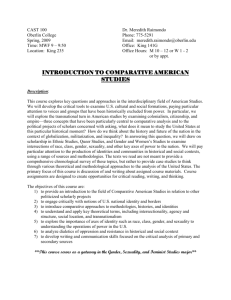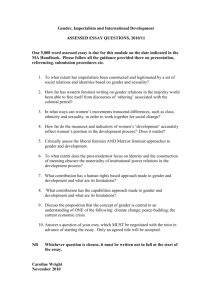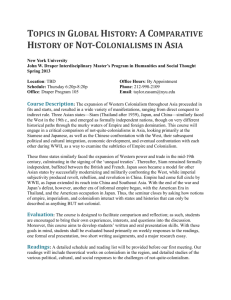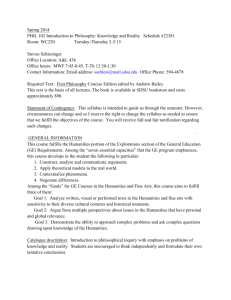CAST 100 - Oberlin College
advertisement
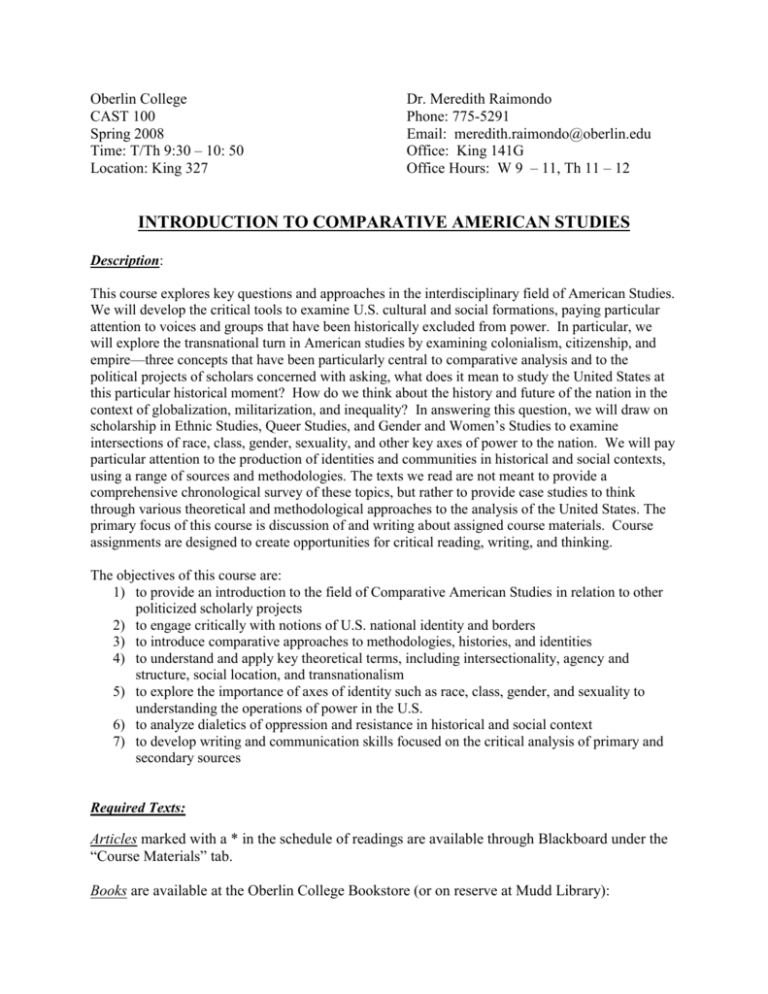
Oberlin College CAST 100 Spring 2008 Time: T/Th 9:30 – 10: 50 Location: King 327 Dr. Meredith Raimondo Phone: 775-5291 Email: meredith.raimondo@oberlin.edu Office: King 141G Office Hours: W 9 – 11, Th 11 – 12 INTRODUCTION TO COMPARATIVE AMERICAN STUDIES Description: This course explores key questions and approaches in the interdisciplinary field of American Studies. We will develop the critical tools to examine U.S. cultural and social formations, paying particular attention to voices and groups that have been historically excluded from power. In particular, we will explore the transnational turn in American studies by examining colonialism, citizenship, and empire—three concepts that have been particularly central to comparative analysis and to the political projects of scholars concerned with asking, what does it mean to study the United States at this particular historical moment? How do we think about the history and future of the nation in the context of globalization, militarization, and inequality? In answering this question, we will draw on scholarship in Ethnic Studies, Queer Studies, and Gender and Women’s Studies to examine intersections of race, class, gender, sexuality, and other key axes of power to the nation. We will pay particular attention to the production of identities and communities in historical and social contexts, using a range of sources and methodologies. The texts we read are not meant to provide a comprehensive chronological survey of these topics, but rather to provide case studies to think through various theoretical and methodological approaches to the analysis of the United States. The primary focus of this course is discussion of and writing about assigned course materials. Course assignments are designed to create opportunities for critical reading, writing, and thinking. The objectives of this course are: 1) to provide an introduction to the field of Comparative American Studies in relation to other politicized scholarly projects 2) to engage critically with notions of U.S. national identity and borders 3) to introduce comparative approaches to methodologies, histories, and identities 4) to understand and apply key theoretical terms, including intersectionality, agency and structure, social location, and transnationalism 5) to explore the importance of axes of identity such as race, class, gender, and sexuality to understanding the operations of power in the U.S. 6) to analyze dialetics of oppression and resistance in historical and social context 7) to develop writing and communication skills focused on the critical analysis of primary and secondary sources Required Texts: Articles marked with a * in the schedule of readings are available through Blackboard under the “Course Materials” tab. Books are available at the Oberlin College Bookstore (or on reserve at Mudd Library): CAST 100 2 Briggs, Laura. Reproducing Empire: Race, Sex, Science, and U.S. Imperialism in Puerto Rico. Berkeley: University of California Press, 2002. Dorow, Sarah. Transnational Adoption. New York: New York University Press, 2006. Espiritu, Yen Li. Home Bound: Filipino Lives across Cultures, Communities, and Countries. Berkeley: University of California Press, 2003. Fischer, Kirsten. Suspect Relations: Sex, Race, and Resistance in Colonial North Carolina. Ithaca: Cornell University Press, 2002. Neptune, Harvey. Caliban and the Yankees: Trinidad and the United States Occupation. University of North Carolina Press, 2007. Stephen, Lynn. Transborder Lives: Indigenous Oaxacans in Mexico, California, and Oregon. Durham: Duke University Press, 2007. Course Policies: Discussion: The academic study of inequality often raises issues which are controversial or evoke strong personal feelings. There are few right answers to the questions we are exploring; my goal in this course is to help you to develop the skills to articulate your own positions. It is therefore critical that everyone commits to making this classroom a space for the honest and open expression of difference. I ask that course members respond to carefully thought-out ideas and questions with patience and respect. Reading: This course requires significant reading. Do not try to read every word; focus on key arguments, methods, and sources. If you find you are having trouble finishing the reading, please see me so we can identify effective strategies for completing the assignments. Late Policy: It is your commitment to this class and your classmates that you will be present and ready to begin work at the start of class. Repeated lateness will result in significant deductions to your final grade in this course. Course assignments must be submitted on time in order to receive full credit. I will deduct 1/3 of a grade for each 24 hours an assignment is late (i.e., from B+ to B). Late papers may not receive written comments. Requests for extensions must be submitted by email at least 48 hours prior to the assignment due date and are generally available only for extraordinary circumstances. If you receive an extension, you must include a copy of my approval (including revised due date) with your assignment in order to receive on-time credit. Papers due in class must be turned in at the start of class to receive on-time credit. CAST 100 3 Assignment Format: Written assignments should word-processed, double-spaced, and use a standard font type and size (12 point Times New Roman or the equivalent). Include your name, the date, a title, and page numbers. If you are required to submit a paper copy, you must staple the pages. Please be sure to proofread carefully for style and grammar. Papers that do not follow proper formatting instructions may receive a 1/3 of a grade deduction. P/NP: If you are taking this course P/NP, you must fulfill all course obligations and complete all assignments in order to receive credit for the course. Honor Code: This course will follow the policies described in the Oberlin College Honor Code and Honor System. Please include the statement “I affirm that I have adhered to the Honor Code in this assignment” in all written work. If you have any questions about academic honesty, citation, or the relationship of the Honor Code to your work in this course, please let me know. Students with Disabilities: If you need disability-related accommodations for your work in this course, please let me know. Support is available through Student Academic Services—please contact Jane Boomer, Coordinator of Services for Students with Disabilities, for assistance in developing a plan to address your academic needs. 1. PARTICIPATION (10%): In order for our time in class together to be as productive as possible, you will be expected to contribute to three areas as follows: Attendance: This course will be primarily conducted as a discussion course; therefore, your consistent on-time attendance is required. After two absences, additional absences will generally lower your final grade in the course (1/3 of a grade per two additional absences). Each late arrival will be counted as one-half of an absence. In case of illness or personal emergency, absences may be excused through a doctor or dean’s note. Discussion: Your thoughtful spoken analysis and active listening will be a central component of your work in this course. If you are uncomfortable speaking in class, please come and see me and we can discuss strategies for your participation. In-class Activities: In-class activities may include discussion in small groups, writing assignments, or other collaborative work. 2. THREE CRITICAL ESSAYS (20% each). 4 - 6 pages each. Each paper corresponds to a section of the course and asks you to think critically about its thematic focus. Due dates are listed below; complete instructions for each essay will be provided in class and on Blackboard under the “Assignments” tab. a. Paper #1: Due Mar 10 at 4 p.m. to King 141-G b. Paper # 2: Due Apr 7 at 4 p.m. to King 141-G c. Paper # 3: Due May 3 at the start of class 3. SMALL GROUP DISCUSSION PROJECT (10% total). The purpose of this project is to provide you with an opportunity to develop your thoughts in a smaller group over the course of the semester. You are required to participate in a total of 10 weekly discussions. Think about how you can use this time to discuss key concepts, analyze readings in greater depth, identify questions and ideas to bring to class discussions, and reflect on the meaning of course concepts to you personally. Because this is a weekly assignment, extensions are not CAST 100 4 available except in case of personal emergency. More details about the required documentation and reflection will be provided in class. a. Discussion Documentation (5%). 1 – 2 pages. Due by Tuesday at the start of class weekly (10 required for full credit). b. Discussion Reflection (5%). 2 – 4 pages. Due May 10 by 12 p.m. 4. FINAL PROJECT (20%). 5 – 6 pages. Due May 15 by 4 p.m. Choose a primary source to analyze in relation to one of the three major course themes (colonialism, citizenship, empire). More detail about this assignment will be provided in class. Summary of Deadlines: Each Tuesday Mar 10 Apr 7 May 8 May 10 May 15 Discussion Documentation Essay 1 Essay 2 Essay 3 Discussion Reflection Final Project Summary of Grading Policy: Participation…………………….10% Essay 1………….………………20% Essay 2………….……................20% Essay 3………………………. ...20% Discussion Documentation………5% Discussion Reflection Project. .…5% Final Project…………………….20% Schedule of Readings: (Please note this schedule may change; if so, you will be informed in advance.) I. COLONIZATION T Feb 5: Introductions Th Feb 7: Settler Colonialism • Haunani Kay Trask, “The Color of Violence,” 8 – 16* • Noriko Ishiyama, “Environmental Justice and American Indian Tribal Sovereignty,” 119 – 139* • Julie Kaomea, “A Curriculum of Aloha?,” 319 – 344* CAST 100 5 T Feb 12: Colonial Spectacles • Sarah Moore, “Mapping Empire in Omaha and Buffalo,” 111 – 126* • Jeff Berglund, “P.T. Barnum’s American Exhibition of Fiji Cannibals,” 29 – 76* Th Feb 14: Colonization and Migration • Espiritu, 1 – 69 T Feb 19: Transnational Social Formation • Espiritu, 70 - 156 T Feb 21: (Post)Colonialism and the Politics of Location • Espiritu, 157 - 222 T Feb 26: The Intimacies of the Colonial • Fischer, 1 – 74 Th Feb 28: Intersectionality and Racialized Sexualities • Fischer, 74 – 130 T Mar 4: Desire, Agency, and Inequalities • Fischer, 131-190 II. CITIZENSHIP Th Mar 6: Transborder Communities • Stephen, 1 – 94 M Mar 10 ***Essay # 1 due at 4 p.m. to King 141-G T Mar 11: Micropractices of Citizenship • Stephen, 95 – 208 Th Mar 13: Agency, Identity, and Organizing • Stephen, 09 - 325 T Mar 18: Social Citizenship • Dorow, 1 - 106 Th Mar 20: Kinship and Nation • Dorow, 107 - 204 T Mar 25: Spring Break Th Mar 27: Spring Break CAST 100 6 T Apr 1: Conjunctions of Difference • Dorow, 205 – 281 • Tamara Buffalo, “Knowing All of My Names,” 218 – 225* Th Apr 3: The Biopolitics of Disaster • Henry Giroux, “Reading Hurricane Katrina,” 171 – 196* M Apr 7: ***Essay # 2 due at 4 p.m. to King 141-G III. EMPIRE T Apr 8: Nation and Empire • Ella Shohat and Robert Stam, “Imperialism and the Fantasies of Democracy,” 298 – 305* • M. Jacqui Alexander, “Not Just (Any)body Can Be a Patriot,” 207 – 240* • Malini Johar Schueller,. “Techno-Dominance and Torturegate,” 162 – 188* Th Apr 10: Gender, Sexuality, Colonialism, Imperialism • Briggs, 1 - 73 T Apr 22: Population and Power • Briggs, 74 - 141 Th Apr 24: The Violence of Empire • Briggs, 74 - 141 T Apr 29: The Politics of Militarization • Neptune, 1 - 77 Th May 1: Forms of Resistance • Neptune, 78 - 157 T May 6: Negotiating Yankee Power • Neptune, 158 - 198 Th May 8: Conclusions ***Essay #3 is due at the start of class S May 10: ***Journal Exchange Assessment due to your Blackboard group site by 12 p.m. Th May 15 Final Project due at 4 p.m. to King 141-G ***PLEASE NOTE: LATE PAPERS WILL NOT BE ACCEPTED CAST 100 7 Bibliography of Articles Alexander, M. Jacqui. “Not Just (Any)body Can Be a Patriot: “Homeland” Security as Empire Building.” In Interrogating Imperialism: Conversations on Gender, Race, and War, ed. Robin Riley and Naeem Inayatullah. New York: Palgrave MacMillan, 2006. 207 – 240. Berglund, Jeff. “P.T. Barnum’s American Exhibition of Fiji Cannibals (1871 – 1873).” In Cannibal Fictions: American Explorations of Colonialism, Race, Gender, and Sexuality. Madison: The University of Wisconsin Press, 2006. 29 – 76. Buffalo, Tamara. “Knowing All of My Names.” In Crossing Waters, Crossing Worlds: The African Diaspora in Indian Country, ed. Tiya Miles and Sharon Holland. Durham: Duke University Press, 2006. 218 – 225. Giroux, Henry. “Reading Hurricane Katrina: Race, Class, and the Biopolitics of Disposability.” College Literature 33, no. 3 (Summer 2006): 171 – 196. Ishiyama, Noriko. “Environmental Justice and American Indian Tribal Sovereignty: Case Study of a Land-Use Conflict in Skull Valley, Utah.” Antipode 35, no. 1 (January 2003): 119 – 139. Kaomea, Julie. “A Curriculum of Aloha? Colonialism and Tourism in Hawai’i’s Elementary Textbooks.” Curriculum Inquiry 30, no. 3 (Fall 2000): 319 – 344. Moore, Sarah. “Mapping Empire in Omaha and Buffalo: World’s Fairs and the SpanishAmerican War.” Bilingual Review 25, no. 1 (Jan-Apr 2000): 111 – 126. Schueller, Malini Johar. “Techno-Dominance and Torturegate: The Making of US Imperialism.” In Exceptional State: Contemporary U.S. Culture and the New Imperialism, ed. Ashley Dawson and Malini Johar Schueller. Durham: Duke University Press, 2007. 162 – 188. Shohat, Ella and Robert Stam, “Imperialism and the Fantasies of Democracy.” Rethinking Marxism 19, no. 3 (2007): 298 – 305. Trask, Haunani Kay. “The Color of Violence,” Social Justice 31, no. 4 (2004): 8 – 16.
